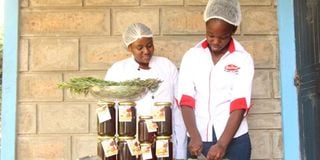Premium
Honey sweetening lives of young innovators

Vera Tracy Agutu and her business partner Easter Hellen demonstrate the process of infusing honey at their Eastnat Food Limited in Kitengela, Kajiado County.
What you need to know:
- Vera Tracy Agutu entered into a partnership with Easter Hellen in 2016 to form Eastnat Food Limited.
- When they started out, their idea was to sell honey from door to door in the neighbourhood.
The meandering dusty road leads the Seeds of Gold team to Kaputiei Estate in Kitengela town, Kajiado County, the home of Eastnat Foods Limited.
It is here that we meet Vera Tracy Agutu and her business partner, Easter Hellen, overseeing a hive of activity at their honey processing and infusion plant.
The plant, which has employed six youths, is designed to accommodate a raw honey delivery point, weighing, processing and packaging areas.
In addition, there is a separate room for honey infusion, which makes Ms Agutu’s enterprise unique.
Ms Agutu entered into a partnership with Ms Hellen in 2016 to form Eastnat Food Limited.
When they started out, their idea was to sell honey from door to door in the neighbourhood.
This gave them the advantage of getting feedback from their clients.
That is how they moved from selling raw or pure honey to making infused honey.
Market trends
She did not know much about the trade and had to learn more about the market trends, an initiative that saw her take a risk and give it a try.
"In 2018, after carrying out market research on the venture, we began using different types of herbs to make infused honey," says Ms Agutu , an International Studies and Diplomacy graduate from the University of Nairobi.
Ms Agutu says availability of herbs in the market made it possible for her to carry out many experiments for different outcomes that would fit different clients.
"I started off by using rosemary (a member of the mint family Lamiaceae) in honey.
Pure honey
The outcome was unimaginable and it struck a chord with clients, who like their tea flavoured with rosemary to get that soothing effect," she says.
She later put in Sh6,000 from her savings to purchase more herbs. She also acquired a blender, honey storage tank and a dehydrator to dry the herbs.
Out of pure honey, Ms Agutu makes products infused with ginger, eucalyptus, vanilla, lemon grass and mint.
She says she sources the herbs from farmers across the country, for instance rosemary is acquired from Kericho and her rural home in Lambwe valley.
On the other hand, vanilla is imported from Uganda as it is not available locally.
She gets a bean for Sh800. It is from vanilla caviar that she extracts pulp that is infused with honey.
Infused honey
"Out of six types of infused honey, rosemary flavour is the most preferred by clients,” she says, adding that they source honey in bulk from Elgeyo-Marakwet, Baringo and Machakos counties.
A kilo of infused honey goes for Sh1,200. It is sold around Kitengela and in Nairobi, Limuru, Nakuru , Kajiado and Machakos.
Ms Agutu and Ms Hellen have also taken to social media to market their products, where they have made contacts with hotels and companies that buy their infused honey in bulk.
On average, Eastnat infuses approximately 20kg of honey every week, up from 10kgs two years ago.
Ms Hellen says the procedure of making infused honey is simple.
Supply of herbs
To begin with, herbs are dried before being crushed into fine powder. The powder is mixed with honey and covered.
"We give it a period of eight days to settle and concentrate and later sieve it to remove particles from the honey and then remain with the particle-free honey with the scent and flavour of herbs,” she adds.
Ms Hellen says infused honey fetches a good market price of Sh1,200 a kilo, compared to pure honey that goes for Sh750, while raw honey sells at Sh450.
According to Ms Hellen, the enterprise has taught them patience in doing business, seeing that it has taken time for their business idea to be transformed into cash.
For instance, when they started out, it was difficult to sell even a kilo of infused honey.
“Young people should try out their ideas and monetise their hobbies through persistence and hard work, so that ideas can be turned into income-generating activities,” she advises.
In any business, challenges abound and for the duo, the major setback is unreliable supply of herbs, which are sometimes out of season, resulting in price fluctuations.
Medicinal aspect
In addition, there is an information gap, with some people expressing concern that infused honey is not pure and is concentrated with chemicals.
Mr Stephen Kagio, a lecturer in Apiculture and Sericulture at Egerton University, says value addition in honey should have a medicinal aspect.
The value chain should indicate to the public what is added to the honey to establish the target market.
According to him, this should be done with care to avoid any interference with the quality of honey.
"Some people who handle honey tend to destroy its quality by either overheating or adding other substances such as sugar. The additives end up making the honey lose its medicinal component,” he adds.
He says dealers in honey should establish their own apiary before recruiting more bee-keepers to ensure consistency in supply of good quality and enough honey.
In addition, Mr Kagio hails the initiative by Ms Agutu and Ms Hellen to carry out value addition in honey, saying there is potential in the honey value chain to create employment opportunities for the youth, who serve in different capacities from harvesting , processing as well as marketing.





